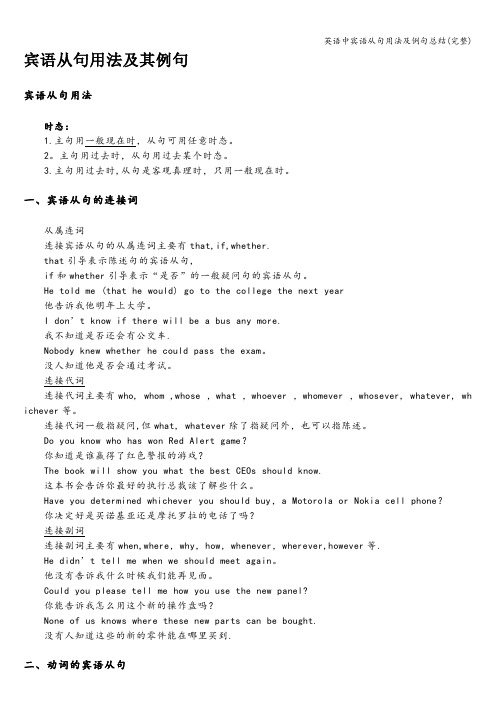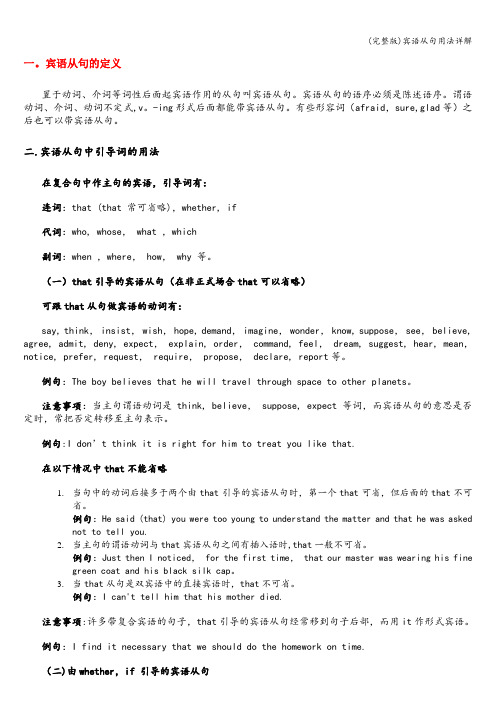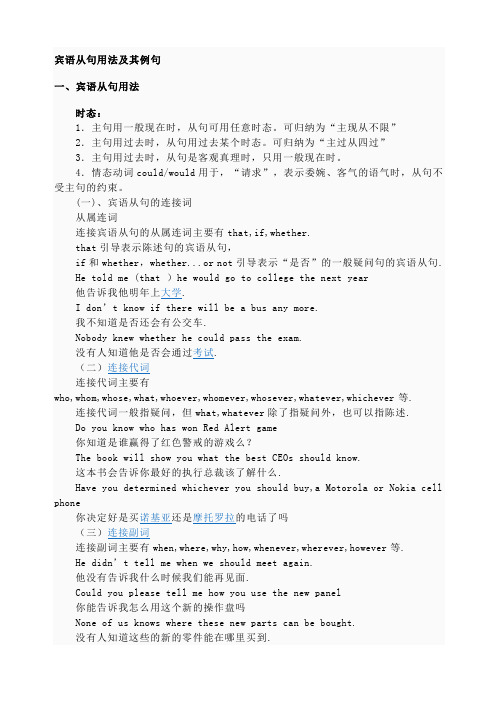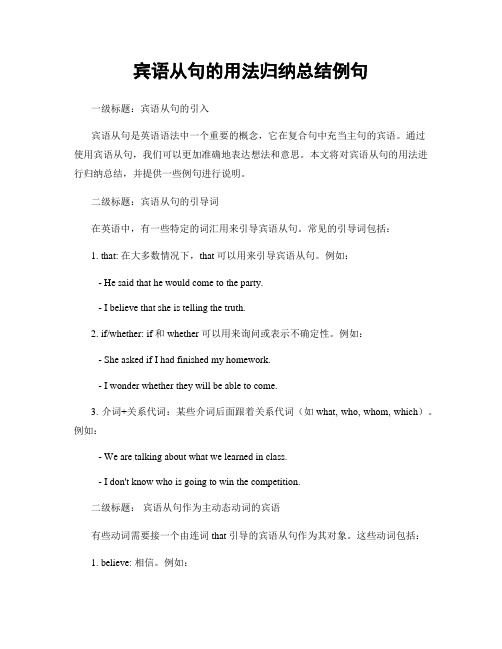宾语从句用法详解(例句丰富)
三大宾语从句的用法及例句

三大宾语从句的用法及例句宾语从句是指在主句中作宾语的从句。
它有三种类型:名词性从句、形容词性从句和副词性从句。
本文将分别介绍这三种类型的宾语从句的用法,并举例说明,以帮助读者掌握宾语从句的用法。
一、名词性从句名词性从句在句子中充当名词的成分,包括主语从句、宾语从句、表语从句和同位语从句。
宾语从句作为动词的宾语,常由连接词that引导,也可以由wh-词引导,如what、who、when、where等。
在使用宾语从句时,需要注意一些关键点:1. 宾语从句的位置宾语从句通常位于及物动词、形容词后面,介词后面,或者某些专门的句式结构中。
例如:He said (that) he would come to the party.I wonder if she has received my letter.She told me where she had been.2. 连词的选择连接宾语从句的连词除了that外,还有wh-疑问词。
在一般情况下,that是最常用的连接词,而wh-词通常用来引导特殊疑问句和感叹句。
例如:I know that he is a good student.She asked where the library is.3. 虚拟形式的使用在名词性从句中,if引导的从句通常表示一种假设或虚拟的情况,因此在虚拟语气的用法上,宾语从句需注意与主句的时态形式和语气搭配。
例如:She would be happy if she were invited.I wish that he were here now.二、形容词性从句形容词性从句是用来修饰名词或代词的从句,通常由as, which, who, whom, whose, where, when, why, that等连词引导。
它为名词或代词提供更多的信息和限定。
在使用形容词性从句时,需要注意以下几点:1. 连词的选择形容词性从句的连接词相对灵活,通常可以根据具体情况选择合适的连接词。
宾语从句用法及其例句

宾语从句用法及其例句【2 】一.宾语从句用法时态:1.主句用一般如今时,从句可用随意率性时态.可归纳为“主现从不限”2.主句用曩昔时,从句用曩昔某个时态.可归纳为“主过从四过”3.主句用曩昔时,从句是客不雅真谛时,只用一般如今时.4.情态动词could/would用于,“请求”,表示委婉.虚心的语气时,从句不受主句的束缚.(一).宾语从句的衔接词从属连词衔接宾语从句的从属连词重要有that,if,whether.that引诱表示陈述句的宾语从句,if和whether,whether...or not引诱表示“是否”的一般疑问句的宾语从句.He told me (that )he would go to college the next year他告知我他来岁上大学.I don’t know if there will be a bus any more.我不知道是否还会有公交车.Nobody knew whether he could pass the exam.没有人知道他是否会经由过程测验.(二)衔接代词衔接代词重要有who,whom,whose,what,whoever,whomever,whosever,whatever,whichever等.衔接代词一般指疑问,但what,whatever除了指疑问外,也可以指陈述.Do you know who has won Red Alert game你知道是谁博得了红色警惕的游戏么?The book will show you what the best CEOs should know.这本书会告知你最好的履行总裁该懂得什么.Have you determined whichever you should buy,a Motorola or Nokia cell phone你决议好是买诺基亚照样摩托罗拉的德律风了吗(三)衔接副词衔接副词重要有when,where,why,how,whenever,wherever,however等.He didn’t tell me when we should meet again.他没有告知我什么时刻我们能再会晤.Could you please tell me how you use the new panel你能告知我怎么用这个新的操作盘吗None of us knows where these new parts can be bought.没有人知道这些的新的零件能在哪里买到.二.动词的宾语从句大多半动词都可以带宾语从句We all expect (that )they will win,for members of theirteam are stronger.我们都预感他们会赢,因为他们的队员更强健.He told us (that) they would help us through the whole work.他告知我们在全部工作中,他们都邑帮忙的.部分“动词+副词”构造也可以带宾语从句I have found out (that) all the tickets for the concerthave been sold out.我发明这场音乐会的所有票都卖光了.Can you work out (that)how much we will spend during thetrip你能盘算出此次观光我们将消费若干钱吗动词短语也可以带宾语从句常见的这些词有:make sure确保make up one’s mind下决心 keep in mind切记Make sure that there are no mistakes in your papers before you turn them in.当你在上交试卷前确保没有任何错误.可应用情势宾语it代替的宾语从句①动词find,feel,consider,make,believe等后面有宾语补足语的时刻,则须要用it做情势宾语而将that宾语从句后置.I think it necessary that we take plenty of hot water every day .我以为天天多喝开水是有必要的.I feel it a pity that I haven’t been to the get-together.我没去聚首,感到异常圆满.I have made it a rule that I keep diaries.我天天写日志成了习惯.We all find it important that we (should) make a quick decision about this matter.我们都以为对这件事立时做出决议很重要.②有些动词带宾语从句时须要在宾语与从句前加it这类动词重要有:hate,take,owe,have,see to.I hate it when they say with their mouths full of food.我憎恶他们满嘴食物时措辞.He will have it that our plan is really practical.他会以为我们的筹划确切可行.We take it that you will agree with us.我们以为你会赞成我们的.When you start the engine,you must see to it that car is in neutral.开启示念头时,必定要使汽车的聚散器处于空挡地位.③若宾语从句是wh-类,则不可用it代替We all consider what you said to be unbelievable.我们都以为你所说的是不可托的.We discovered what we had learned to be valuable.我们发明我们所学到的器械都是有价值的.三.介词的宾语从句用wh-类的介词宾语从句:We are talking about whether we admit students into our club.我们正在评论辩论是否让学生参加我们的俱乐部.The new book is about how Shenzhou 6 manned spaceship wassent up into space.这本新书是关于神州6号载人航天飞船是若何升入太空的.用that,if引诱的介词宾语从句有时刻except,but,besides三个介词后可见到that引诱的宾语从句I know nothing about my new neighbor except that he used to work with a company.对于我的新邻人我只知道他曾在一家公司上班,其他一窍不通.四.形容词的宾语从句常用来引诱宾语从句的形容词有:sure,certain,glad,please,happy,sorry,afraid,satisfied,surprisedI am sure I will pass the exam.我确信我会经由过程测验.I am sorry that I have troubled you so long.很抱歉我这么长时光在打搅你.He is glad that Li Ming went to see him when he was ill.他很愉快在他生病的时刻李明能去探望他.五.if,whether在宾语从句中的差别① if和whether在作“是否”解时,引诱宾语从句常放在动词know,ask,care,wonder,find out等之后,介词后一般不用if② 少数动词,如:leave,put,discuss,doubt后的宾语从句常用whether.③ whether后可以加or not,但是if不可以.④ 在不定式前只能用whether.(如:I can’t decide whether to stay. 我不能决议是否留下.)⑤ 避免歧异时,我们常用whether而不用if.六.哪些宾语从句不可以省略引诱词that当that作learn,suggest,explain,agree,wonder,prove,mean,state,feel,hold等动词的宾语时;当宾语从句较长时;当主语状语置于主句尾,宾语从句之前时;当主语谓语动词(包括非谓语动词)与宾语从句之间有插入语时;当一个动词带有两个或两个以上宾语从句时,此时第一个that可以省略,第二个that不可以省略;当宾语从句中的主语是this,that或this,that做主语的定语时;当宾语从句是双宾语中的直接宾语时;当宾语从句的主语长短谓语动词或主语从句时;当主语中的谓语动词是固定词组时;当宾语从句有it做其先行词时;在直接引语中,转述分句把宾语从句离隔时.七.宾语从句的否认转移宾语从句的反意疑问句主句的谓语动词是think,believe,imagine,suppose,consider,expect,fancy,guess等,并且主句的主语是第一人称并且为一般如今时,从句的否认词一般要转移到主句上来,其反义疑问句一般与宾语从句一致.I don’t think he will come to my party.而不能说成I think he won’t come to my party.我以为他不会来我的舞会.I don’t believe that man is killed by Jim,is he我以为那小我不是Jim所杀的,是不是假如宾语从句中有某个含有否认意义的形容词或副词,其反义疑问句要用确定情势.We find that he never listens to the teacher carefully,does he我们发明他从来不仔谛听先生授课,是不是八.宾语从句的时态和语序当主句为如今时或未来时,宾语从句的时态一般不受主句的时态所影响.当主句为曩昔时①从句用一般曩昔时或曩昔进行时表示与主句谓语动词动作同时产生I only knew he was studying in a western country,but Ididn’t kn ow what country he was in.我只知道他当时在西方的一个国度念书,可不知道是哪个国度.He asked me if I was reading the story The Old Man and the Sea when he was in.他问我他进来的时刻我是否正在读<<白叟与海>>.②从句曩昔完成时表示该动作产生在主句谓语动作之前He told me that he had told Mary about the meeting already.他告知我他已经把有关会议的工作告知了Mary.③从句谓语用曩昔未来时表示该动作产生在主句谓语动作之后The reporter asked if the government would take necessary measures to put down the to-do.记者问当局是否会采取必要的措施镇压动乱.④假如从句是一个客不雅真谛,那么从句的时态不依据主句的时态而变化The teacher said that the moon goes around the earth yesterday.先生昨天说月亮围着地球转.⑤当宾语从句的引诱词是who,which,what,when,where,how,why等表疑问时,不能按正常语序安排,经常将这类引诱词置于句首Who do you think the public might choose as their favorite singer this year你以为本年大众会选谁为他们最爱好的歌手.编辑本段宾语从句(版本二)进修宾语从句要抓住三要素:衔接词.语序和时态.1.引诱词1.从句为陈述句,常选择引诱词that或将that省略,直接与主句相连.2.从句为一般疑问句,常选择引诱词if或whether.在whether … ornot 构造中不能用 if 调换.3.从句为特别疑问句,常选择what,when,where,which,who,how等的疑问代.副词作引诱词.留意:当who为主语时,句式为:who+谓语+其他2.断定时态情况1.主句是一般如今时,从句为各类时态情况.2.主句是一般曩昔时,从句为各类响应曩昔时态留意:从句描写客不雅事实,用一般如今时.3.关系代词:that,who,whom,whose,whicheg: 1. The teacher told the children that the sun____ round.A. wasB. isC. wereD. are2. I believe that our team____ the basketball match.A. winB. wonC. will winD. wins3.I don’t know____ to visit the old man.A. whetherB. ifC. thatD. who4.The soldiers soon reached( )was once an old temple( )the villagers used as a school.A.which;whereB.what;whichC.where;whichD.what;where答:选B,动词reach后接宾语从句,从句缺乏宾语,where不可,which引诱宾语从句时表疑问寄义“哪一个…”而此句中并非疑问寄义,不知道哪一座寺院,而是用what从句表陈述寄义,意“曩昔的一座旧寺院”;temple后为对其润饰的定语从句,用关系代词which代替,并在从句中作动词used的宾语,use sth. as…“把…用作…宾语从句用作宾语.如:Do you know where he lives定语从句相当于一个形容词,用于润饰前面的名词.如:The student who answered the question was John. 答复问题的学生是John.This is the man whom he is looking for.Do you know the girl who is in red?语法~~~~~~~~~~~~~~~~~~~~~~~~~~~~~~~~~~~~~~~~~~~~~~~~~~~~~~~~~~~~~~~ 3.宾语从句的用法1.that引诱宾语从句无意义,不充当句子成分常省略.但下列情况除外:1.介词宾语从句的that不省略2. and衔接的几个从句,第二个从句今后的从句的that不省略.He told me that he had two sons and that they both had goneto college.3.在动词+it+宾语补足语+宾语从句构造中,that不省略.I heard it said that he had gone abroadWe found it impossible that he could finish it in such ashort time2.Whether,if 引诱宾语从句:两词可交流,但是下列情况除外:1.whether从句中有or not2.whether从句做介词宾语Everything depends on whether you agree with us3.很多带复合宾语的句子,宾语从句经常移到句子后部,而用it做情势宾语.构造常是:主语+动词+it+形容词/名词等宾语补足语+宾语从句We think it wrong that he told a lie to everyone4.宾语从句的语序要用陈述句语序False: He is wondering when can he finish this difficult job.Right: He is wondering when he can finish this difficult job.B 有时刻可以用it 作情势宾语,而把真正的宾语从句放在后面.Bad: I thought that he could finish this job in just two hours impossible.Good: I thought it impossible that he could finish this job in just two hours.Bad: He left whether we should continue this project to my judgment.Good: He left it to my judgment whether we should continue this project.C 带有宾语从句的复合句的否认情势一般是否认主句.Bad: I think he doesn’t like the English teacher.Good: I don’t think he likes the English teacher.D 主句一般曩昔时态,从句也要用曩昔时态;具体细节请看第一部分.False: He wanted to know why he is crying in the corner.Right: He wanted to know why he was crying in the corner. 编辑本段宾语从句(版本三)宾语从句,在复合句中作宾语,位于及物动词后.eg.Tell him which class you are in .Do you know what he likes?注:(1)主.从句时态一致主句谓语曩昔时,从句响应曩昔时;He answered that he was listening to me.主句谓语如今时,从句时态任所需;eg. He says (that) he will leave a message on my desk.They know (that) he is working hard.具体曩昔永不变,真谛格言如今时;eg.He told me that he was born in 1980.Father told me that practice makes perfect .(2)否认前移,及完成反意问句在think / believe / suppose / guess / imagine / expect等动词后跟宾语从句否认式时,应转移到主句上去,完成反意问句时,应与从句主.谓保持一致.(注:否认前移的前提是,主句主语是第一人称)eg. I don't think you are right,are youI don't believe they have finished their work yet,have they(3)应用虚拟语气的情况在表示:建议 suggest .advise.propose;请求demand .desire.request;决议 decide;敕令 mand.require;果断主意 insist;等动词后跟宾语从句,用(should)+v.(虚拟语气)eg. I suggested that you(should)study hard.He ordered that we should go out at once.(4)宾语从句后置情况假如宾语从句后有宾语补语,用it作情势宾语,把宾语从句后置eg.You may think it strange that he would live there.(5)宾从中that不可省略的情况宾语从句that常可省略,但在以下情况下不能省略A.当主句谓语动词带有两个或两个以上宾语从句时,可以省略第一个that,其他不能省略.eg.I believe(that)you have done your best and that thingswill get better.B.当it作情势宾语时eg.She made it clear that she had nothing to do with him.C.当宾语从句前置时eg.That our team will win,I believe.编辑本段宾语从句(版本四)一.界说和宾从例句剖析宾语从句就是一个句子作动词或介词的宾语.A 作动词的宾语:I heard the news.主语谓语动词名词作宾语I heard that he would come here later on.主语谓语动词一个句子作宾语---宾语从句B 作介词的宾语:He said nothing about the plan.主语谓语动词代词作动词的宾语介词名词作介词的宾语He said nothing about who broke the window last night.主语谓语动词代词作动词的宾语介词一个句子作介词的宾语二.带有宾语从句的复合句的组成带有宾语从句的复合句就是用衔接词把一个主句和一个宾语从句衔接在一路.衔接词有:that(可省略),what,who,when,where,why,which,if,whether,how.1 He suggested (that) we should clean the corridor every day.宾语2 He told me (that) he would leave Dalian airport at 8pm.间接宾语直接宾语3 He told me where he was going to travel that summer.间接宾语直接宾语4 He wanted to know what the manager had said at the meeting.who hadn’t passed the exam.when she would leave this building.why she cried last night.where she was going to study.which student was his partner in the short play.if (whether) Tom could play basketball with him that morning.how she managed to solve the problem.why water flows from a high position to a lower position.在例子4中,当主句是曩昔时态时(一般曩昔时,曩昔进行时,曩昔未来时,曩昔完成时),从句依据不同情况必须应用曩昔时态的一种,(大天然的现象和真谛除外).5 He is wanting to know what I can cook for dinner.who broke the window yesterday.when I can have a holiday.why I failed the exam yesterday.where I should have dinner with my friend tonight.which book is the best one.if (whether) I have passed the exam.how my cat escaped from the room last night.在例子5中,当主语是如今时态时(一般如今时,如今进行时,一般未来时,如今完成时),从句可依据不同情况应用各类时态.三.留意A 宾语从句必须用陈述语序.False: He is wondering when can he finish this difficult job.Right: He is wondering when he can finish this difficult job.B 有时刻可以用it 作情势宾语,而把真正的宾语从句放在后面.Bad: I thought that he could finish this job in just two hours impossible.Good: I thought it impossible that he could finish this jobin just two hours.Bad: He left whether we should continue this project to my judgment.Good: He left it to my judgment whether we should continuethis project.C 带有宾语从句的复合句的否认情势一般是否认主句.Bad: I think he doesn’t like the English teacher.Good: I don’t think he likes the English teacher.D 主句一般曩昔时态,从句也要用曩昔时态;具体细节请看第一部分.False: He wanted to know why he is crying in the corner.Right: He wanted to know why he was crying in the corner.宾语从句的点点滴滴宾语从句是英语复合句中的个中异常重要的从句之一.它是用一个句子做另一个句子的宾语,将这个句子叫做宾语从句.宾语从句做介词或及物动词的宾语.如今从下列三个方面总结归纳如下:一,引诱词A,由that 引诱的陈述句性的宾语从句,在很多动词如say,think,wish,hope,see,believe,agree,expect,hear,feel等动词后.连词that只起衔接感化,在从句中不做句子的成分,也无词汇意义,在白话中常被省略,但在大多半情况下照样以不省为好,特别是在笔语中.例:I told him that he was wrong.l在think,believe,suppose,expect等动词引起的宾语从句中,有时谓语尽管是否认意义,却不用否认情势,而将think 等动词变为否认情势.例:I don’t think you ar e right. (我以为你做的不对)l在很多带有复合宾语的句子中,that引诱的宾语从句经常移到句子的后面,而用it做情势宾语.例:We think it wrong that he told a lie to everyone (我以为他向每一小我说谎是错误的)B,由连词if. whether 引诱的表示“是否…”的宾语从句.Whether,if 在从句中不做句子的成分,一般情况下,whether和if 可以调换.例:I don’t know if/whether he will come tomorrow.The teacher asked if/whether we had finished the experiment.l在介词后面的宾语从句中不用if引诱例:Everything depends on whether we have enough money.l宾语从句中有or not时不用if引诱.例:I don’t know whether the movie s tar will come or not.l和不定式连用作宾语时不用if引诱.例:Whether to go there or not hasn’t been decided.C,由wh-引诱的宾语从句.衔接代词who,whom,whose,what,which,和衔接副词when,where,why,how 等衔接的宾语从句,它们在句中即有衔接从句的感化,又在句中充当句子的成分.例:Do you know which film they are talking about? (which做定语)I don’t know where he lives. (where 做地点状语)二,宾语从句的语序,宾语从句从句的语序必须是陈述语序,即衔接词+主语+谓语+其他成分例:I believe that they will come soon.He asked me whether I was a teacher.They wanted to know what they can do for us.二,宾语从句的时态.宾语从句的时态受主句的限制,既:主句是一般如今时态,从句依据现实情况而定.主句是一般曩昔时态,从句用响应的曩昔的时态.假如从句的动作产生在主句之前,则从句要用曩昔完成时态.例:1)She says that she is a student.She said that she was a student.2)She says that she will fly to Japan in a week.She said that she would fly to Japan in a week.3)She says that she has finished her homework already.She said that she had finished her homework already.4)She says that she can sing a song in English.She said that she could sing a song in English.l假如宾语从句说的是客不雅真谛.天然现象或事及时,这时宾语从句要用一般如今时态.例:The teacher said that the earth goes round the sun.He told me that Japan is an island country.lCould you tell me…是用来征询对方的看法,语气委婉,并不表示曩昔.例:Could you tell me when we will visit the Histury Museum留意事项:u由陈述句变成宾语从句时,要留意人称的变化.例:She said: “I have been to England before.”She said that she had been to England before.She asked me: “Do you like maths?”She asked me if I liked maths.u宾语从句与简略句的交流.由衔接代词和衔接副词引诱的宾语从句,假如宾语从句的主语和主句的主语是统一小我时,可以用“疑问词+不定式”做宾语的简略句构造.例:I don’t know what I should do next.I con’t know what to do next.He didn’t know where he would live.He didn’t know where to live.DO SOME EXERCISES:1.Can you see________A. what he’s readingB. what is he readingC. what does he readD. he reads what2.Does Jack come from Japan? Do you know?(归并成一个句子) Do you know_____Jack _____from Japan3._What did your son say in the letter_He told me that he___ the Disney would the next dayA.will visitB. has visitedC. is going to visitD. would visit4.He didn’t know__________A.what’s the matterB.what the matter isC. what was the matterD. what the matter was 5.Somebody called you just now,but I didn’t know____A.who were theyB. who they wereC. who was itD. who it was6.I want to know_____A.what is his nameB. what’s his nameC. that his name isD. what his name is7.---Could you tell me ___she is looking for---Her cousin,susan.A.thatB.whose C .who D.which8.---What are you searching the Internet for---I’m trying to find out____.A.What is the difference between SARS and BIRDFLUB.How many persons have died in IraqC.How to protect our environmentD.Why is our Chinese team be able to beat Korea 9. Do you know___________?(谁正在唱歌)10. Do you know___________?(她正在和谁谈话)11. Do you know___________?(昨天产生了什么事)The keys: 1 A.2 if,comes.3D. 4 D. 5 D. 6 D. 7 C. 8 B9 who is singing10 who she is talking with11 what happened yesterday。
英语中宾语从句用法及例句总结(完整)

宾语从句用法及其例句宾语从句用法时态:1.主句用一般现在时,从句可用任意时态。
2。
主句用过去时,从句用过去某个时态。
3.主句用过去时,从句是客观真理时,只用一般现在时。
一、宾语从句的连接词从属连词连接宾语从句的从属连词主要有that,if,whether.that引导表示陈述句的宾语从句,if和whether引导表示“是否”的一般疑问句的宾语从句。
He told me (that he would) go to the college the next year他告诉我他明年上大学。
I don’t know if there will be a bus any more.我不知道是否还会有公交车.Nobody knew whether he could pass the exam。
没人知道他是否会通过考试。
连接代词连接代词主要有who, whom ,whose ,what ,whoever ,whomever ,whosever, whatever, wh ichever等。
连接代词一般指疑问,但what, whatever除了指疑问外,也可以指陈述。
Do you know who has won Red Alert game?你知道是谁赢得了红色警报的游戏?The book will show you what the best CEOs should know.这本书会告诉你最好的执行总裁该了解些什么。
Have you determined whichever you should buy,a Motorola or Nokia cell phone?你决定好是买诺基亚还是摩托罗拉的电话了吗?连接副词连接副词主要有when,where,why,how,whenever,wherever,however等.He didn’t tell me when we should meet again。
(完整版)宾语从句用法详解

一。
宾语从句的定义置于动词、介词等词性后面起宾语作用的从句叫宾语从句。
宾语从句的语序必须是陈述语序。
谓语动词、介词、动词不定式,v。
-ing形式后面都能带宾语从句。
有些形容词(afraid,sure,glad等)之后也可以带宾语从句。
二.宾语从句中引导词的用法在复合句中作主句的宾语,引导词有:连词:that (that 常可省略),whether, if代词:who, whose, what ,which副词:when ,where, how, why 等。
(一)that引导的宾语从句(在非正式场合that可以省略)可跟that从句做宾语的动词有:say, think, insist, wish, hope, demand, imagine, wonder, know, suppose, see, believe, agree, admit, deny, expect, explain, order, command, feel, dream, suggest, hear, mean,notice, prefer, request, require, propose, declare, report等。
例句:The boy believes that he will travel through space to other planets。
注意事项:当主句谓语动词是 think, believe, suppose, expect 等词,而宾语从句的意思是否定时,常把否定转移至主句表示。
例句:I don’t think it is right for him to treat you like that.在以下情况中that不能省略1.当句中的动词后接多于两个由that引导的宾语从句时,第一个that可省,但后面的that不可省。
例句:He said (that) you were too young to understand the matter and that he was askednot to tell you.2.当主句的谓语动词与that宾语从句之间有插入语时,that一般不可省。
宾语从句用法及其例句

宾语从句用法及其例句一、宾语从句用法时态:1.主句用一般现在时,从句可用任意时态。
可归纳为“主现从不限”2.主句用过去时,从句用过去某个时态。
可归纳为“主过从四过”3.主句用过去时,从句是客观真理时,只用一般现在时。
4.情态动词could/would用于,“请求”,表示委婉、客气的语气时,从句不受主句的约束。
(一)、宾语从句的连接词从属连词连接宾语从句的从属连词主要有that,if,whether.that引导表示陈述句的宾语从句,if和whether,whether...or not引导表示“是否”的一般疑问句的宾语从句.He told me (that )he would go to college the next year他告诉我他明年上大学.I don’t know if there will be a bus any more.我不知道是否还会有公交车.Nobody knew whether he could pass the exam.没有人知道他是否会通过考试.(二)连接代词连接代词主要有who,whom,whose,what,whoever,whomever,whosever,whatever,whichever等.连接代词一般指疑问,但what,whatever除了指疑问外,也可以指陈述.Do you know who has won Red Alert game你知道是谁赢得了红色警戒的游戏么?The book will show you what the best CEOs should know.这本书会告诉你最好的执行总裁该了解什么.Have you determined whichever you should buy,a Motorola or Nokia cell phone你决定好是买诺基亚还是摩托罗拉的电话了吗(三)连接副词连接副词主要有when,where,why,how,whenever,wherever,however等.He didn’t tell me when we should meet again.他没有告诉我什么时候我们能再见面.Could you please tell me how you use the new panel你能告诉我怎么用这个新的操作盘吗None of us knows where these new parts can be bought.没有人知道这些的新的零件能在哪里买到.二、动词的宾语从句大多数动词都可以带宾语从句We all expect (that )they will win,for members of their team are stronger.我们都预料他们会赢,因为他们的队员更强壮.He told us (that) they would help us through the whole work.他告诉我们在整个工作中,他们都会帮忙的.部分“动词+副词”结构也可以带宾语从句I have found out (that) all the tickets for the concert have been sold out.我发现这场音乐会的所有票都卖光了.Can you work out (that)how much we will spend during the trip你能计算出这次旅行我们将花费多少钱吗动词短语也可以带宾语从句常见的这些词有:make sure确保make up one’s mind下决心 keep in mind牢记Make sure that there are no mistakes in your papers before you turn them in.当你在上交试卷前确保没有任何错误.可运用形式宾语it代替的宾语从句①动词find,feel,consider,make,believe等后面有宾语补足语的时候,则需要用it做形式宾语而将that宾语从句后置.I think it necessary that we take plenty of hot water every day .我认为每天多喝开水是有必要的.I feel it a pity that I haven’t been to the get-together.我没去聚会,感觉非常遗憾.I have made it a rule that I keep diaries.我每天写日记成了习惯.We all find it important that we (should) make a quick decision about this matter.我们都认为对这件事马上做出决定很重要.②有些动词带宾语从句时需要在宾语与从句前加it这类动词主要有:hate,take,owe,have,see to.I hate it when they say with their mouths full of food.我讨厌他们满嘴食物时说话.He will have it that our plan is really practical.他会认为我们的计划确实可行.We take it that you will agree with us.我们认为你会同意我们的.When you start the engine,you must see to it that car is in neutral.开启发动机时,一定要使汽车的离合器处于空挡位置.③若宾语从句是wh-类,则不可用it代替We all consider what you said to be unbelievable.我们都认为你所说的是不可信的.We discovered what we had learned to be valuable.我们发现我们所学到的东西都是有价值的.三、介词的宾语从句用wh-类的介词宾语从句:We are talking about whether we admit students into our club.我们正在讨论是否让学生加入我们的俱乐部.The new book is about how Shenzhou 6 manned spaceship was sent up into space.这本新书是关于神州6号载人航天飞船是如何升入太空的.用that,if引导的介词宾语从句有时候except,but,besides三个介词后可见到that引导的宾语从句I know nothing about my new neighbor except that he used to work with a company.对于我的新邻居我只知道他曾在一家公司上班,其他一无所知.四、形容词的宾语从句常用来引导宾语从句的形容词有:sure,certain,glad,please,happy,sorry,afraid,satisfied,surprisedI am sure I will pass the exam.我确信我会通过考试.I am sorry that I have troubled you so long.很抱歉我这么长时间在打扰你.He is glad that Li Ming went to see him when he was ill.他很高兴在他生病的时候李明能去看望他.五、if,whether在宾语从句中的区别① if和whether在作“是否”解时,引导宾语从句常放在动词know,ask,care,wonder,find out等之后,介词后一般不用if② 少数动词,如:leave,put,discuss,doubt后的宾语从句常用whether.③ whether后可以加or not,但是if不可以.④ 在不定式前只能用whether.(如:I can’t decide whether to stay. 我不能决定是否留下。
英语中宾语从句用法及例句总结(完整)

宾语从句用法及其例句宾语从句用法时态:1.主句用一般现在时,从句可用任意时态。
2.主句用过去时,从句用过去某个时态。
3.主句用过去时,从句是客观真理时,只用一般现在时。
一、宾语从句的连接词从属连词连接宾语从句的从属连词主要有that,if,whether.that引导表示陈述句的宾语从句,if和whether引导表示“是否”的一般疑问句的宾语从句.He told me (that he would) go to the college the next year他告诉我他明年上大学.I don’t know if there will be a bus any more.我不知道是否还会有公交车.Nobody knew whether he could pass the exam.没人知道他是否会通过考试.连接代词连接代词主要有who, whom ,whose ,what ,whoever ,whomever ,whosever, whatever, whichever等.连接代词一般指疑问,但what, whatever除了指疑问外,也可以指陈述.Do you know who has won Red Alert game?你知道是谁赢得了红色警报的游戏?The book will show you what the best CEOs should know.这本书会告诉你最好的执行总裁该了解些什么.Have you determined whichever you should buy,a Motorola or Nokia cell phone?你决定好是买诺基亚还是摩托罗拉的电话了吗?连接副词连接副词主要有when,where,why,how,whenever,wherever,however等.He didn’t tell me when we should meet again.他没有告诉我什么时候我们能再见面.Could you please tell me how you use the new panel?你能告诉我怎么用这个新的操作盘吗?None of us knows where these new parts can be bought.没有人知道这些的新的零件能在哪里买到.二、动词的宾语从句大多数动词都可以带宾语从句We all expect that they will win , for members of their team are strong er.我们都预料他们会赢,因为他们的队员更强壮.He told us that they would help us through the whole work.他告诉我们在整个工作中,他们都会帮忙的.部分“动词+副词”结构也可以带宾语从句I have found out that all the tickets for the concert have been sold out.我发现这场音乐会的所有票都卖光了.Can you work out how much we will spend during the trip?你能计算出这次旅行我们将花费多少钱吗?动词短语也可以带宾语从句常见的这些词有:make sure确保make up one’s mind下决心keep in mind牢记Make sure that there are no mistakes in your papers before you turn th em in.在上交试卷前确保没有任何错误.可运用形式宾语it代替的宾语从句①动词find,feel,consider,make,believe等后面有宾语补足语的时候,则需要用it 做形式宾语而将that宾语从句后置.I think it necessary that we take plenty of hot water every day .我认为每天多喝开水是有必要的.I feel it a pity that I haven’t been to the get-together.我没去聚会,感觉非常遗憾.I have made it a rule that I keep diaries.我每天写日记成了习惯.We all find it important that we (should) make a quick decision about t his mater.我们都认为对这件事马上做出决定很重要.②有些动词带宾语从句时需要在宾语与从句前加it这类动词主要有:hate, take , owe, have, see to.I hate it when they with their mouths full of food.我讨厌他们满嘴食物时说话.He will have it that our plan is really practical.他会认为我们的计划确实可行.We take it that you will agree with us.我们认为你会同意我们的.When you start the engine, you must see to it that car is in neutral.开启发动机时, 一定要使汽车的离合器处于空挡位置.③若宾语从句是wh-类,则不可用it代替We all consider what you said to be unbelievable.我们都认为你所说的是不可信的.We discovered what we had learned to be valuable.我们发现我们所学到的东西都是有用的.三、介词的宾语从句用wh-类的介词宾语从句We are talking about whether we admit students into our club.我们正在讨论是否让学生加入我们的俱乐部.The new book is about how Shenzhou 6 manned spaceship was sent u p into space.这本新书是关于神州6号载人航天飞船是如何升入太空的.用that,if引导的介词宾语从句有时候except,but,besides三个介词后可见到that引导的宾语从句I know nothing about my new neighbor except that he used to work wit h a company.对于我的新邻居我只知道他曾在一家公司上班,其他一无所知.四、形容词的宾语从句常用来引导宾语从句的形容词有: sure,certain,glad,please,happy,sorry,afraid,s atisfied,surprisedI am sure I will pass the exam.我确信我会通过考试.I am sorry that I have troubled you so long.很抱歉我这么长时间在打扰你.He is glad that Li Ming went to see him when he was ill.他很高兴在他生病的时候李明能去看望他.五、if,whether在宾语从句中的区别①if和whether在作“是否”解时,引导宾语从句常放在动词know,ask,care,wond er,find out等之后,介词后一般不用if②少数动词,如:leave,put,discuss,doubt后的宾语从句常用whether.③whether后可以加or not,但是if不可以.④在不定式前只能用whether.(如:I can’t decide whether to stay. 我不能决定是否留下。
宾语从句的用法归纳总结例句

宾语从句的用法归纳总结例句一级标题:宾语从句的引入宾语从句是英语语法中一个重要的概念,它在复合句中充当主句的宾语。
通过使用宾语从句,我们可以更加准确地表达想法和意思。
本文将对宾语从句的用法进行归纳总结,并提供一些例句进行说明。
二级标题:宾语从句的引导词在英语中,有一些特定的词汇用来引导宾语从句。
常见的引导词包括:1. that: 在大多数情况下,that 可以用来引导宾语从句。
例如:- He said that he would come to the party.- I believe that she is telling the truth.2. if/whether: if 和 whether 可以用来询问或表示不确定性。
例如:- She asked if I had finished my homework.- I wonder whether they will be able to come.3. 介词+关系代词:某些介词后面跟着关系代词(如what, who, whom, which)。
例如:- We are talking about what we learned in class.- I don't know who is going to win the competition.二级标题:宾语从句作为主动态动词的宾语有些动词需要接一个由连词that 引导的宾语从句作为其对象。
这些动词包括:1. believe: 相信。
例如:- I believe that he is honest.2. know: 知道。
例如:- Do you know that she is coming tomorrow?3. think: 认为。
例如:- She thinks that it will rain tonight.二级标题:宾语从句作为被动态动词的宾语有些动词后面可以接一个宾语从句作为其对象,表示被动的意义。
三大宾语从句的用法及例句

三大宾语从句的用法及例句宾语从句是一个句子,它作为一个名词的宾语出现在一个句子中。
根据其引导词的不同,宾语从句可以分为三种类型:宾语从句、宾语从句和强调宾语从句。
下面将分别介绍这三种宾语从句的用法和例句。
一、宾语从句宾语从句由连词"that"引导,用于表示一种说法、信念、指示或意图。
宾语从句通常出现在及物动词(例如think, believe, hope, know等)、及物介词后,并且在主句中充当宾语的成分。
1.1 用法当宾语从句表达的观点或说法与主句的动词表示的意义相符时,宾语从句的时态通常与主句相同。
而当宾语从句表达的观点或说法与主句的动词表示的意义不相符时,宾语从句的时态通常要根据实际情况进行变化。
1.2 例句1) He said (that) he would come to the party.(他说他会参加派对。
)2) She believes (that) he is a good student.(她相信他是个好学生。
)3) I hope (that) you are doing well.(我希望你一切都好。
)二、宾语从句宾语从句由关联词"whether"或"if"引导,用于表示选择、询问、疑惑或愿望等情况。
宾语从句通常出现在及物动词、介词、形容词或名词后。
2.1 用法当宾语从句表达选择、询问、疑惑或愿望等情况时,通常用"whether"或"if"引导宾语从句。
"whether"用于表达选择和疑惑,"if"用于表达询问和愿望。
2.2 例句1) I wonder whether he will come.(我想知道他是否会来。
)2) She asked if it was going to rain.(她问天气是否会下雨。
)3) They don't know whether to go or stay.(他们不知道是去还是留。
- 1、下载文档前请自行甄别文档内容的完整性,平台不提供额外的编辑、内容补充、找答案等附加服务。
- 2、"仅部分预览"的文档,不可在线预览部分如存在完整性等问题,可反馈申请退款(可完整预览的文档不适用该条件!)。
- 3、如文档侵犯您的权益,请联系客服反馈,我们会尽快为您处理(人工客服工作时间:9:00-18:30)。
宾语从句用法详解(例句丰富)
一、宾语从句的引导词
宾语从句通常由连词that和whether (if)、连接代词或连接副词以及关系代词型what引导:1. that引导
We believe that he is honest. 我们相信他是诚实的。
The doctor insists that I give up smoking医生坚持要我戒烟。
I suggest that we should go tomorrow. 我建议我们明天走。
I suggested that we should go the next day. 我建议我们第二天走。
We learnt from his letter that he was in Spain. 从他的信里我们了解到他在西班牙。
The seller demanded that payment should be made within five days. 卖方要求5日内付款。
2. whether / if引导
I don't know whether he'll arrive in time. 我不知道他是否能及时到。
I didn't know whether they liked the place. 我不知道他们是否喜欢这个地方。
I'll see whether I can induce him to accept it. 我要看看我是否能劝他接受。
I asked her whether she agreed. 我问她是否同意。
He enquired if her parents spoke Spanish. 他问她父母是否讲西班牙语。
I wonder if it's large enough. 我不知道它是否够大。
She didn't say if he was still alive. 她没说他是否还活着。
3. 连接代词引导
I don't know who [whom] you mean. 我不知道你指谁。
Please tell me which you like. 告诉我你喜欢哪一个。
I'Il do whatever I can do. 我将做我所能做的事。
You can take whichever you like. 你爱拿哪个就拿哪个吧。
We'll do whatever we can to save him. 我们将尽我们所能来挽救他。
Take whichever seat you like. 你要坐哪个座就坐哪个座位。
Give it to whoever you like. 你把它爱给谁就给谁。
You don't know what you are talking about. 你在说什么,你自己也不知道。
Tomorrow at this time we’ll know who is elected. 明天这时候我们就会知道谁当选了。
4. 连接副词引导
He asked why he had to go alone. 他问他为什么必须一个人去。
You don't know when you are lucky. 你身在福中不知福。
I asked how he was getting on. 我问他情况怎样。
He knows where they live. 他知道他们住哪里。
Have you found out how wide the ditch Was? 你了解到那条沟有多宽吗?
I'd like to know when they will let him out. 我很想知道他们什么时候会放他出来。
We didn't know why he had answered in that fashion. 我们不明白他为什么这样回答。
5. 关系代词what引导
She has got what she wanted. 她要的东西得到了。
I want to tell you what I hear. 我想把听到的情况告诉你。
He could not express what he felt. 他无法表达内心的感受。
They did what they could to console her. 他们尽量安慰她。
They thought they could do what they liked with him. 他们以为他们可以对他为所欲为。
【注意】有时介词后可接一个宾语从句(但介词后通常不接that和if引导的宾语从句):
From what you say, he is right. 根据你所说的,他是对的。
有极个别介词(如but, except)可接that引导的宾语从句:
She remembered nothing about him except that his hair was black. 她对他什么都不记得,只记得他的头发是黑的。
比较下面两句用what引导的宾语从句,它们的意思不一样:
He began to think about what he should do. 他开始考虑应当怎样做。
二、宾语从句与形式宾语it
当宾语从句后跟有宾语补足语时,通常在宾语从句处使用形式宾语it,而将真正的宾语从句移至句末:
I think it best that you should stay here. 我认为你最好住这儿。
He hasn't made it known when he is going to get married. 他还没宣布他何时结婚。
She found it difficult to answer the question. 她发现回答这个问题很困难。
He feels it his duty to hetp others. 他认为帮助别人是他的责任。
He thought it best to be on his guard. 他认为他最好还是要警惕。
He made it a rule to speak in Parliament at least once every session. 他规定自己在议会每次开会时至少发一次言。
I find it interesting talking go you. 我觉得同你谈话很有意思。
I consider it wrong to cheat in an examination. 我认为考试作弊是不对的。
三、连词that的省略问题
引导宾语从句的连词that 通常可以省略:
She said (that) she would come to the meeting. 她说过要来开会的。
I promise you (that) I will be there. 我答应你我会去。
I hoped (that) I would / should succeed. 我曾希望我会成功。
He thinks (that) they will give him a visa. 他想他们会给他签证。
He thought (that) they would give him 3 visa. 他本想他们会给他签证。
I expect (that) the plane will he diverted. 我料想飞机会改变航线。
I expected (that) the plane would be diverted. 我本料想飞机会改变航线。
Everybody knows (that) money doesn't grow on trees. 众所周知,金钱是不会从树上长出来的。
I suggested (that) they should / shouldn't drive along the coast. 我建议他们沿着/ 不要沿着海岸开车。
【注】有时为了强调,that引导的宾语从句可位于句首,此时that不可省略:
That she is a good girl I know. 她是一个好姑娘,我是知道的。
四、宾语从句与否定转移
当动词think, believe, suppose, expect, imagine 后接一个表示否定意义的宾语从句时,其否定通常转移到主语:
I don't suppose that it is true. 我认为那不是真的。
I don't imagine that he will come. 我想他不会来的。
I don't think we need waste much time on it. 我想我们不必在这上面花太多时间
We didn't think we'd be this late. 我们没想到我们会到得这么晚。
I don't suppose I'll trouble you again. 我想我不要再麻烦你了。
